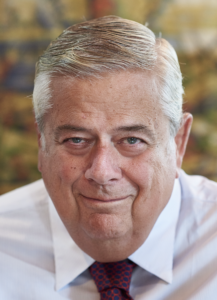 Robert Dilenschneider, a longtime Darien resident and DMA member, is frequently called upon by the media to provide commentary and strategic public relations insights on major news stories. He has counseled major corporations, professional groups, trade associations and educational institutions, and has assisted clients in dealings with regulatory agencies, labor unions, and consumer groups, among others.Bob formed The Dilenschneider Group in October, 1991. Headquartered in New York and Chicago, the Firm provides strategic advice and counsel to Fortune 500 companies and leading families and individuals around the world, with experience in fields ranging from mergers and acquisitions and crisis communications to marketing, government affairs and international media.
Robert Dilenschneider, a longtime Darien resident and DMA member, is frequently called upon by the media to provide commentary and strategic public relations insights on major news stories. He has counseled major corporations, professional groups, trade associations and educational institutions, and has assisted clients in dealings with regulatory agencies, labor unions, and consumer groups, among others.Bob formed The Dilenschneider Group in October, 1991. Headquartered in New York and Chicago, the Firm provides strategic advice and counsel to Fortune 500 companies and leading families and individuals around the world, with experience in fields ranging from mergers and acquisitions and crisis communications to marketing, government affairs and international media.
Bob has written a number of books, including this summer’s The Ultimate Guide to Power & Influence: Everything You Need to Know.
Prior to forming his own firm, Bob served as president and chief executive officer of Hill and Knowlton, Inc. from 1986 to 1991, tripling that Firm’s revenues to nearly $200 million and delivering more than $30 million in profit. He was with that organization for nearly 25 years.
He started in public relations in 1967 in New York, shortly after receiving an M.A. in journalism from The Ohio State University, and a B.A. from the University of Notre Dame.
In 2012 The Dilenschneider Group established the Civility in America Lecture Series, which features many of the nation’s leading thinkers from a wide variety of professions and provides a perspective on what must be done to restore civility in our country.
Speaker arranged by Tom Igoe.
Summary
Robert Dilenschneider spoke of the key principles for leadership as the importance of honesty, listening, compromise, and admitting mistakes in leadership. He spoke about the upcoming election, stressing its significance and urging people to vote despite the challenges posed by the candidates. Furthermore, he touched on the global impact of political leaders and emphasizes the need for better leadership, both in the U.S. and internationally.
Bob offered his views on the media, social media’s impact on society, and the importance of effective crisis management. Drawing from his professional experiences, he shared insights into the importance of surrounding oneself with capable teams during crises, admitting mistakes promptly, and learning from them. He drew examples from prominent figures like FDR, Jack Welch, and consumer products such as Tylenol, illustrating the lasting impact of leadership decisions on public trust and organizational success.
In summary, his talk discussed leadership, power, responsibility, and influence in the context of business and politics, with a focus on integrity, decision-making, and the importance of civility in a polarized society.
